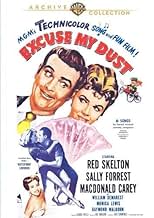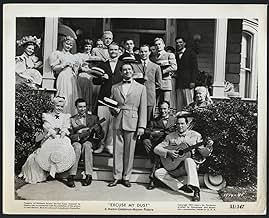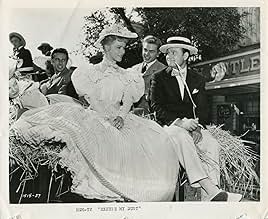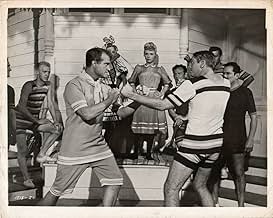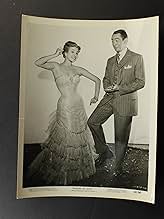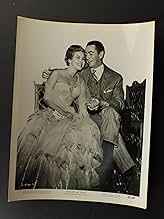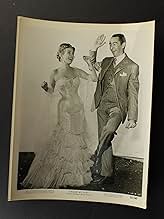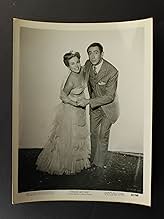IMDb RATING
6.0/10
434
YOUR RATING
In 1895, a small-town inventor faces ridicule over his gasoline-powered car. His girlfriend supports him, but success brings romantic complications. During a horseless vehicle race, he needs... Read allIn 1895, a small-town inventor faces ridicule over his gasoline-powered car. His girlfriend supports him, but success brings romantic complications. During a horseless vehicle race, he needs his loyal girlfriend's help.In 1895, a small-town inventor faces ridicule over his gasoline-powered car. His girlfriend supports him, but success brings romantic complications. During a horseless vehicle race, he needs his loyal girlfriend's help.
Herbert Anderson
- Ben Parrott
- (as Guy Anderson)
Jessie Arnold
- Woman on Street
- (uncredited)
Polly Bailey
- Woman on Street
- (uncredited)
Featured reviews
MGM was never a good studio for slapstick comedians, but this time they got it right. Red Skelton had the misfortune to appear in a group of inept comedies for MGM which missed the mark for the most part. This comedy is terrific and Skelton is terrific in it. The comedy is set at the turn of the 20th Century with Skelton as an ambitious, but accident prone, inventor working on an early automobile. Although he is not given much in the way of witty dialogue, he is given ample opportunity to show his physical comedy skills. Although he plays a misunderstood dreamer, Skelton does not play a total nincompoop. While still a mugging comedian, he is likable and sympathetic. The supporting cast is just right with Macdonald Carey as Skelton's rival, Herbert Anderson as Skelton's straight man, Sally Forrest as his love interest and supporting character actors William Demarest and Raymond Walburn adding to the comedy. Monica Lewis is cast as the soubrette and is given two clever specialty numbers by Arthur Schwartz and Dorothy Fields. Forrest is given a good dance specialty. Skelton gets to sing the best song in the score, "Spring Has Sprung". The screenplay contains some clever satire concerning the industrial age, and, of course, there is the obligatory auto race at the end of the picture. The Technicolor photography is beautiful, but it does not take away from the comedy. This is a really fine, feel good, slapstick opus.
I love Sally Forrest. Sally Forrest is known mostly for her film noir films, especially those for director Ida Lupino. But Sally Forrest was a great dancer who was born to star in lavish MGM musicals. Just didn't happen...well...almost just didn't happen. Check out MGM's Excuse My Dust, a Red Skelton musical. Red Skelton was the poor man's Bob Hope and always seemed better suited for black-and-white B-movies like "The Fuller Brush Man." As a side kick opposite Ricardo Montalban or Esther Williams he seemed like Robin Williams in Sound of Music. Excuse My Dust tries to blend wacky slap stick and colorful musical and does all right. The highlight of the film is when Red imagines Sally Forrest in modern clothes doing a very sexy jazz dance. Sally Forrest had an unusual dance style that was like tap slowed down to jazz. This costumed turn-of-the-century musical is certainly Sally's most colorful film which at least shows off her musical talents as well as her legs. (See also "Son of Sinbad" for Sally's most sexy dance segment--another Sally Forrest film in color!, and "The Strip" a black-and-white Mickey Rooney film noir cheapie that features Miss Forrest as a nightclub dancer).
I thought I was familiar with all of Red Skelton's movies. When I saw the title come up , I assumed it was Ron Howard's Eat My Dust. While I always liked Ron , I was excited to find out this was a Red movie I had not seen. I agree 100% with another review that said a different title was needed.
Yes , as a musical, not in the upper tier , but not many are. The dance scene's brought Sally Forrest to the fore. My goodness, had never heard of her , but she dances up a storm. The same with Monica Lewis in the singing department. Dennis the Menace's father , Herbert Anderson was good in an assistant role , and Macdonald Carey was good also. When William Demarest would yell at Red , it immediately took me back to him yelling at Ernie or Chip.
All in all , was surprised how much I enjoyed it. Give it a look.
Yes , as a musical, not in the upper tier , but not many are. The dance scene's brought Sally Forrest to the fore. My goodness, had never heard of her , but she dances up a storm. The same with Monica Lewis in the singing department. Dennis the Menace's father , Herbert Anderson was good in an assistant role , and Macdonald Carey was good also. When William Demarest would yell at Red , it immediately took me back to him yelling at Ernie or Chip.
All in all , was surprised how much I enjoyed it. Give it a look.
In reviewing the so-called golden age of the MGM musical, sometimes it's instructive to bypass the big, accomplished, but pretentious famous titles (An American In Paris, The Band Wagon, On the Town, Kismet) and skip to the smaller movies produced by someone other than Arthur Freed. This 1951 tuner from the Jack Cummings unit is probably Red Skelton's best movie, which may not be saying much, but it's a very smart and pleasing little musical that doesn't wear out its welcome (it's a trim 80 minutes or so). Red's dopey slapstick is kept to a minimum (just two set pieces, at the beginning and the end), and what's in between is surprisingly gentle and well-written Americana -- in sunny Technicolor. The underrated score, by Dorothy Fields and Arthur Schwartz (who wrote another wonderful score for Broadway that year, the equally underrated "A Tree Grows In Brooklyn"), is solidly integrated into the plot, and the musical staging, by Hermes Pan, is bright and inventive. (The movie contains what may be the least plot-motivated "dream ballet" ever, but even it's quick and unpretentious.) Sally Forrest is pretty as a picture and a heck of a dancer, and Monica Lewis socks two comedy numbers across. They will help you past the dum-dum physical comedy that was Skelton's stock in trade.
It's no award-winner, nor did it do much at the box office, but it holds up much better than some of the bigger, weightier MGM titles.
It's no award-winner, nor did it do much at the box office, but it holds up much better than some of the bigger, weightier MGM titles.
Fans of Red won't find him doing one of his ditzy characters here. Instead, most of the comedy comes from the set-ups with Red reacting in often normal ways. He's an inventor, most importantly of one of the first gas-mobiles (cars), whose worth he's got to prove against defenders of the horse & buggy. At the same time, he's got to somehow wangle lady-love Sally Forrest away from her cranky old livery stable owner father, Bill Demarest. And it doesn't help that rival Macdonald Carey's out to sabotage Red at every turn. So there's plenty of plot to drive things along.
My guess is that the biggest attraction now are those picturesque old autos that amount to a real curiosity. The climactic auto race provides a good chance to sample the various experimental modes of propulsion, from steam to electricity to gasoline. Then too, some of the talk about polluting autos seems almost contemporary. Nonetheless, the rural picnic scenes are utterly charming and visually compelling, along with Monica Lewis' spirited warbling and Forrest's imaginative dance number. All in all, the movie's an unexpectedly interesting and lively slice of entertainment, though not the best showcase for Skelton's brand of slapstick humor.
My guess is that the biggest attraction now are those picturesque old autos that amount to a real curiosity. The climactic auto race provides a good chance to sample the various experimental modes of propulsion, from steam to electricity to gasoline. Then too, some of the talk about polluting autos seems almost contemporary. Nonetheless, the rural picnic scenes are utterly charming and visually compelling, along with Monica Lewis' spirited warbling and Forrest's imaginative dance number. All in all, the movie's an unexpectedly interesting and lively slice of entertainment, though not the best showcase for Skelton's brand of slapstick humor.
Did you know
- TriviaThe original "Morgan" automobile in La Splendeur des Amberson (1942) was also used in this film.
- GoofsA few times during the race, wide tire tracks from more modern automobiles can be seen on the dirt roads.
- ConnectionsFeatured in The Metro-Goldwyn-Mayer Story (1951)
- SoundtracksI'd Like to Take You Out Dreaming
Music by Arthur Schwartz
Lyrics by Dorothy Fields
Performed by Macdonald Carey and Chorus
Details
Box office
- Budget
- $1,789,000 (estimated)
- Runtime
- 1h 22m(82 min)
- Aspect ratio
- 1.37 : 1
Contribute to this page
Suggest an edit or add missing content


